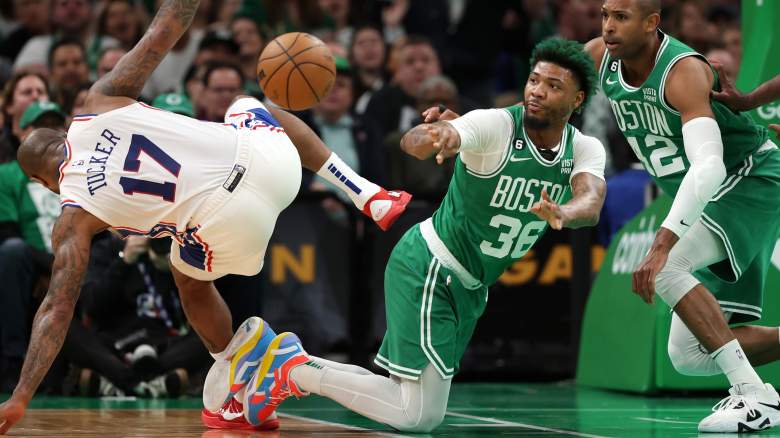
Getty Marcus Smart of the Celtics vs. the Sixers in the East playoffs.
BOSTON — If you don’t like Marcus Smart, you may want to turn away now. Reading on may cause deep affection for the Celtics‘ Tasmanian devil.
The latest merit badge has nothing to do with his 15-point hustle-filled effort in Wednesday’s 121-87 Game 2 victory over the Sixers in Round 2 of the NBA playoffs. It came at the end of a conversation with Heavy Sports in which Smart insisted he wasn’t afraid the Celts would handle prosperity poorly and get into trouble when the series shifts to Philadelphia.
He was reminded of the Three Stooges episode when Moe asks Larry if he’s scared. Larry says he’s just apprehensive. Asked what that means, Larry says, “It means you’re scared — with a college education.”
The fact Smart was able to harmonize on that last line will no doubt earn him greater support in this area that embraces the traditional Stooges marathon on New Year’s Eve.
But prior to this dive into the classics, Smart was getting pressed on the Celtics’ habit of letting their collective foot off the gas, as witnessed by their stumbling into a six-game series against Atlanta, when four or, at most, five should have done the trick.
After one denial, he was asked if he’s worried maybe just a liiii-tle bit.
“No,” he told Heavy as he stood by his locker late Wednesday. “I’m not. I’m not worried a little bit. Now, you know, am I aware? Yes. Worried? No. But we’re very aware of it, and we’ve got to fight every day to make sure that we don’t let that creep in. We’ve got to keep going.”
Smart Hoping Celtics Adapt in Philadelphia
The aware part comes in when Smart admits these Celtics have to fight to avoid the lapses that have come to define perhaps the most concerning part of their game as they seek a return to the NBA Finals.
“Yeah, we do,” he said. “We’re human, and it’s not going to be perfect. We’re playing against some great teams, great players. It’s the playoffs. And in the playoffs, we all know it’s about adjustments. It’s about adapting. You know, last game they came out and they had a game plan. They executed and they won. This we came out, we had a game plan we had to adapt to their game plan, and we won. So it’s all about adapting and making the right changes.”
In this one, it seemed the change in the Celtic game plan was essentially picking up the Sixers defensively in the hallway outside the visitors’ dressing room.
“Yeah, definitely,” said Smart. “We just wanted to go out there and just make it as tough as possible. You know, they’re great players, and if they’re comfortable, they’re really hard to guard.”
Celtics Pressure Defense Was the Game 2 Key
The Philadelphians were exceedingly comfortable in Game 1, shooting 50.6% from the floor and racking up 119 points. In Game 2 Wednesday, the Sixers went nowhere without a Celtic in their grill — or ribs. The guests shot 39.2% overall and just 20% (6-for-30) from beyond the 3-point arc.
Doc Rivers wasn’t happy with the way his team reacted, but he gave much of the credit for those numbers to the Celts’ defensive pressure.
“That’s it,” Smart said of extending the defense. “That’s it. We have a lot of guys who are very versatile, so for you to hold anything back is not the right thing to do. If you’re tired or you feel like you need a break, come out. We’ve got other guys ready to do it. We’ve got a deep roster this year. So being able to just impose our will, wear them down as much as possible, hopefully those shots in the fourth quarter don’t fall because they don’t have enough legs.”
Not surprisingly in the highly connected nature of the game, that kind of defensive energy can keep the Celtics from slipping into a nap at the other end of the floor. Stagnancy has naggingly crept into the Boston offense on far too many occasions.
Greater intensity on defense invokes Newton’s first law of motion. Objects in motion (in this case, the Celtics) stay in motion.
“It forces you not to get stagnant,” said Smart. “You’re moving quick on the defensive end and your body’s warming up. You’re going and it’s just straight instinct and adrenaline. And when you see someone playing really hard and really good defense — they dive on the ball, they get a blocked shot, they get a turnover — you feel it. You’ve got to run. Now you want to run. Now you want to get down the floor and you want to make the right play for them, because they gave it everything, and you want to give it everything for them.”
Like five musketeers. Or, if you prefer, Stooges.